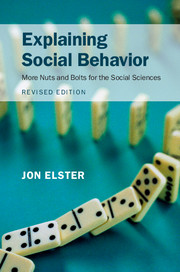Book contents
- Frontmatter
- Dedication
- Contents
- Preface
- I Explanation and Mechanisms
- II The Mind
- III Action
- 10 Constraints: opportunities and abilities
- 11 Reinforcement and selection
- 12 Persons and situations
- 13 Rational choice
- 14 Rationality and behavior
- 15 Responding to irrationality
- 16 Implications for textual interpretation
- IV Interaction
- Conclusion: is social science possible?
- Index
13 - Rational choice
from III - Action
Published online by Cambridge University Press: 05 August 2015
- Frontmatter
- Dedication
- Contents
- Preface
- I Explanation and Mechanisms
- II The Mind
- III Action
- 10 Constraints: opportunities and abilities
- 11 Reinforcement and selection
- 12 Persons and situations
- 13 Rational choice
- 14 Rationality and behavior
- 15 Responding to irrationality
- 16 Implications for textual interpretation
- IV Interaction
- Conclusion: is social science possible?
- Index
Summary
The structure of rational action
In this chapter, and in Chapter 18, I state some normative principles about how people should behave to realize their aims, whatever they might be, as well as possible. These principles can also have explanatory power, if we assume that social agents abide by them. In Chapter 14 and Chapter 19 I confront this assumption with empirical observations, and find it to be partly unfounded.
Rational-choice theorists want to explain behavior on the bare assumption that agents are rational. This assumption includes the hypothesis that agents form rational beliefs, including beliefs about the options available to them. There is no need, therefore, to classify the determinants of behavior as either subjective (desires) or objective (opportunities). Rational-choice theory is subjective through and through.
The structure of rational-choice explanation is laid out in Figure 13.1. An action is rational, in this scheme, if it meets three optimality requirements: the action must be optimal, given the beliefs; the beliefs must be as well supported as possible, given the evidence; and the evidence must result from an optimal investment in information gathering. In Figure 13.1 the arrows have a double interpretation, in terms of causality as well as of optimality. The action, for instance, should be caused by the desires and beliefs that make it a rational one; it is not enough to do the right thing by fluke. Similarly, a belief is not rational if it is the outcome of two oppositely biased processes that exactly cancel each other. To take an example, smokers as well as non-smokers process information about the dangers of smoking in ways that make them believe these are greater than in fact they are. At the same time, smokers are subject to a self-serving bias that makes them discount the risks. If as a result they form the same belief as an unbiased observer would hold, that does not prove they are rational. In one of the most influential discussions of rationality in the social sciences, Max Weber made the mistake of inferring “process rationality” from “outcome optimality” when he wrote that:
for the purposes of a typological scientific analysis it is convenient to treat all irrational, affectually determined elements of behavior as factors of deviation from a conceptually pure type of rational action.
- Type
- Chapter
- Information
- Explaining Social BehaviorMore Nuts and Bolts for the Social Sciences, pp. 235 - 254Publisher: Cambridge University PressPrint publication year: 2015



